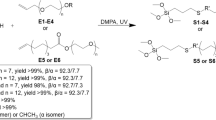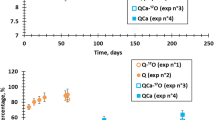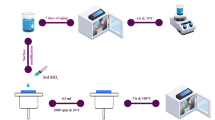Abstract
IN the course of a study on the nature of the surface hydroxyl group of silicate glasses, it has been found that glass surfaces become permanently hydrophobic after being treated for 1 hr. with a dry, 30 per cent toluene solution of p-nitrobenzyl bromide at a temperature of 100° C. The effect was found with vitreous silica, borosilicate glasses and glasses of other composition. The most pronounced results were obtained with glass surfaces which had been freshly cleaved under distilled water and vacuum-dried before treatment with the above solution. The treated surfaces remained hydrophobic after prolonged exposure to common organic solvents and water.
This is a preview of subscription content, access via your institution
Access options
Subscribe to this journal
Receive 51 print issues and online access
$199.00 per year
only $3.90 per issue
Buy this article
- Purchase on Springer Link
- Instant access to full article PDF
Prices may be subject to local taxes which are calculated during checkout
Similar content being viewed by others
References
Taggart, A. F., Trans. Amer. Inst. Min. Met. Eng., 87, 285 (1930).
Wark, I. W., and Cox, A. B., Trans. Amer. Inst. Min. Met. Eng., 112, 189 (1934).
Kellog, H. H., Glass Science Bull., 2, 58 (1945).
Author information
Authors and Affiliations
Rights and permissions
About this article
Cite this article
HALLER, W., DUECKER, H. Modification of Glass Surfaces by p-Nitrobenzyl Bromide. Nature 178, 376–377 (1956). https://doi.org/10.1038/178376b0
Issue Date:
DOI: https://doi.org/10.1038/178376b0
Comments
By submitting a comment you agree to abide by our Terms and Community Guidelines. If you find something abusive or that does not comply with our terms or guidelines please flag it as inappropriate.



